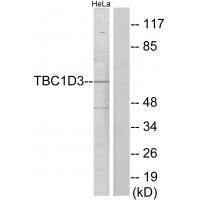
| WB | 1/500-1/3000 | Human,Mouse,Rat |
| IF | 咨询技术 | Human,Mouse,Rat |
| IHC | 咨询技术 | Human,Mouse,Rat |
| ICC | 技术咨询 | Human,Mouse,Rat |
| FCM | 咨询技术 | Human,Mouse,Rat |
| Elisa | 咨询技术 | Human,Mouse,Rat |
| Aliases | TBC1 domain family member 3; Rab GTPase-activating protein PRC17; Prostate cancer gene 17 protein; TRE17 alpha protein; TBC1D3 |
| Entrez GeneID | 414060;729873; |
| WB Predicted band size | 62kDa |
| Host/Isotype | Rabbit IgG |
| Antibody Type | Primary antibody |
| Storage | Store at 4°C short term. Aliquot and store at -20°C long term. Avoid freeze/thaw cycles. |
| Species Reactivity | Human |
| Immunogen | Synthesized peptide derived from internal of human TBC1D3. |
| Formulation | Purified antibody in PBS with 0.05% sodium azide. |
+ +
以下是3篇涉及TBC1D3抗体的相关文献摘要概括:
1. **《TBC1D3 promotes oncogenic transformation of human mammary epithelial cells via suppression of AKT》**
- 作者:Wang, Y. et al.
- 摘要:研究利用TBC1D3特异性抗体发现,其在乳腺癌细胞中过表达并通过抑制AKT信号通路促进肿瘤发生,揭示了其作为潜在治疗靶点的可能性。
2. **《TBC1D3 regulates the trafficking and signaling of EGFR in prostate cancer》**
- 作者:Chen, Z. et al.
- 摘要:通过免疫沉淀结合TBC1D3抗体,发现该蛋白在前列腺癌细胞中调控EGFR内吞和下游MAPK信号传导,影响肿瘤侵袭性。
3. **《TBC1D3 interacts with the human papillomavirus 16 E6 oncoprotein to promote cell proliferation》**
- 作者:Li, H. et al.
- 摘要:研究使用TBC1D3抗体进行共定位分析,发现其与HPV16 E6蛋白相互作用,通过泛素化降解p53促进宫颈癌细胞增殖。
4. **《TBC1D3 enhances macrophage phagocytosis through activation of the PI3K/Akt pathway》**
- 作者:Zhang, L. et al.
- 摘要:通过Western blot和TBC1D3抗体检测,揭示该蛋白在巨噬细胞中激活PI3K/Akt通路,增强病原体清除能力,与免疫调控相关。
以上研究均基于TBC1D3抗体的实验验证,探讨其在癌症、病毒感染及免疫中的分子机制。
The TBC1D3 antibody is a tool used to detect the TBC1D3 protein, a member of the TBC (Tre-2/Bub2/Cdc16) domain-containing family. TBC1D3. primarily expressed in primates, functions as a GTPase-activating protein (GAP) that regulates small GTPases like Rab5 and Rab11. influencing endocytic trafficking and receptor signaling. It plays roles in cell proliferation, migration, and survival, often implicated in cancer due to its amplification in certain tumors and interaction with oncogenic pathways such as EGFR and RAS-MAPK.
The antibody is critical in research to study TBC1D3’s localization, expression levels, and interactions in cellular processes. It is used in techniques like Western blotting, immunofluorescence, and immunoprecipitation to explore its role in vesicle transport, signal transduction, and tumorigenesis. Studies have shown TBC1D3 overexpression enhances growth factor signaling and promotes tumor progression, making it a potential therapeutic target. However, species specificity must be considered, as TBC1D3 is absent in non-primate models. Researchers rely on validated antibodies to ensure specificity, particularly given homology with other TBC proteins. Its study contributes to understanding cancer mechanisms and developing targeted therapies.
×